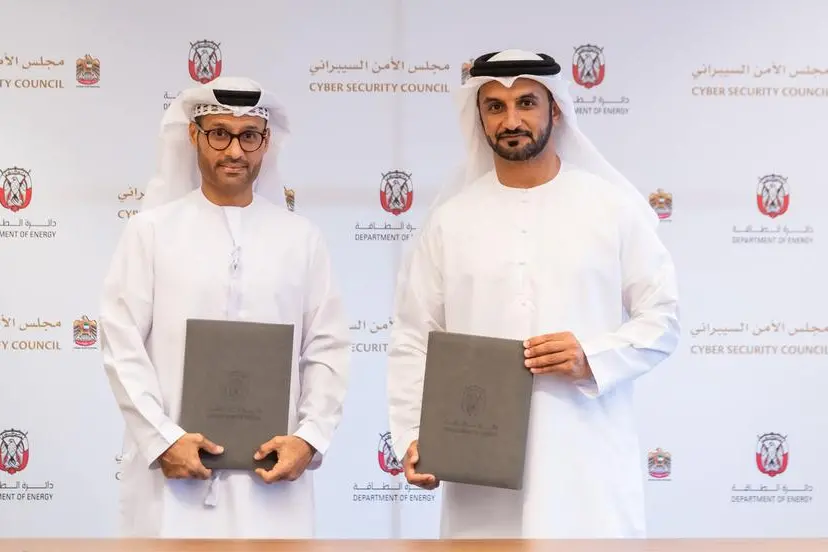PHOTO
Abu Dhabi, United Arab Emirates: The Abu Dhabi Department of Energy (DoE) announced today that it had signed a Memorandum of Understanding (MoU) with the Cyber Security Council, aimed at enhancing security of the UAE’s energy sector. The DoE will cooperate with other Abu Dhabi government entities in an effort to improve government performance, within the fast-paced digital transformation in the UAE.
The MoU was signed during a meeting between His Excellency Eng. Ahmed Mohammed Al Rumaithi, Undersecretary of the Department of Energy in Abu Dhabi, and His Excellency Dr. Mohammed Hamad Al-Kuwaiti, Head of Cyber Security for the UAE Government.
The MoU aims to align the efforts of the DoE and the Cyber Security Council as they develop and disseminate innovative technologies that enhance the digital and cyber-security capabilities of the energy sector in Abu Dhabi. Both parties will exchange expertise and data in fields related to information and communication technologies, cyber-security risks, electronic espionage, hacking, cyber-terrorism, and disinformation campaigns, among others, which are increasing in pace with the accelerated adoption of modern technologies.
Both parties are committed to cooperating and implementing cyber-security standards in the energy sector in Abu Dhabi, in addition to developing national capabilities to deter and prevent cyber-attacks and provide immediate response when a government facility is exposed to such attacks or hacking attempts.
The MoU includes information sharing about the spread of malware and promising solutions in the field of information security, as well as participation in awareness building, educational programmes and scientific research. The two parties will organise mutual workshops, conferences and educational visits, and cyber-security training in diverse sectors.
His Excellency Eng. Ahmed Mohammed Al Rumaithi, Undersecretary of the Department of Energy in Abu Dhabi, affirmed the department's priority to ensure the security of information and communication technology, protect its data and networks from cyber-threats and avoid potential damage. He said: “Information and communication technology is one of the key pillars of social and economic development in any country. However, with the acceleration of technological developments, digital attacks are becoming more diversified and vicious, posing serious threats to individuals and institutions. Therefore, we must work to ward off these risks in the digital space, and protect all sectors and industries, including the energy sector.”
Al Rumaithi added that the department will hold a series of joint meetings with the Cyber Security Council to enable experts and working teams from both sides to exchange ideas, information, and experiences, and learn about the latest cyber-security trends and technologies.
His Excellency Dr. Mohamed Hamad Al-Kuwaiti, Head of Cyber Security for the UAE Government, expressed his happiness with the cooperation and partnership between the Cyber Security Council and the Abu Dhabi Department of Energy. He said that it formed part of their efforts aimed at developing a comprehensive cyber security strategy, establishing a safe and resilient cyber security infrastructure in the UAE, and promoting this culture among institutions and individuals.
Al-Kuwaiti explained that the Cyber Security Council embodies the forward-looking vision of the UAE leadership, as well as the country's proactive approach in dealing with the various challenges posed by the acceleration of digital technologies, through its collaborations with specialized entities such as the Abu Dhabi Department of Energy to ensure digital protection, effective business continuity and provision of services.
Al Kuwaiti added that this agreement will contribute to strengthening efforts to transform the UAE into a leading global hub for cyber security for the benefit of countries across the region.



















